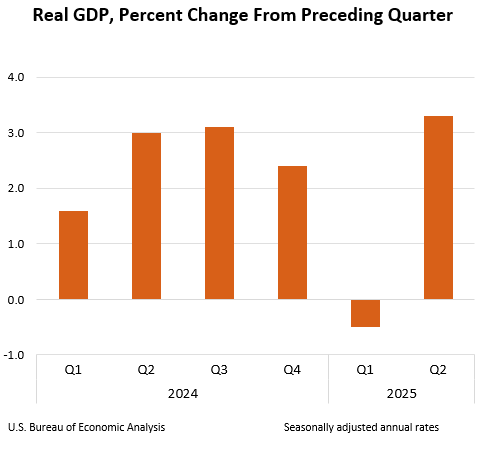Bureau of Economic Analysis
Gross Domestic Product, 2nd Quarter 2025 (Second Estimate) and Corporate Profits (Preliminary)
Real gross domestic product (GDP) increased at an annual rate of 3.3 percent in the second quarter of 2025 (April, May, and June), according to the second estimate released by the U.S. Bureau of Economic Analysis. In the first quarter, real GDP decreased 0.5 percent. The increase in real GDP in the second quarter primarily reflected a decrease in imports, which are a subtraction in the calculation of GDP, and an increase in consumer spending. These movements were partly offset by decreases in investment and exports.
Principal Federal Economic Indicators
Noteworthy
- 2025 News Release Schedule
- Innovation at BEA
- 2025 Annual Updates
- Distribution of Personal Income Nowcast
- New! Services Trade Data for More Countries
- Data Tool: Trade in Value Added
- Updated: RIMS II Regional Multipliers
- Arts and Culture
- Space Economy
- FDI Now in State BEARFACTS
- Quick Guide: Price Indexes
The Latest
U.S. Current-Account Deficit Decreases in Second Quarter 2014
The U.S. current-account deficit-the combined balances on trade in goods and services, income, and net unilateral current transfers – decreased to $98.5 billion (preliminary) in the second quarter of 2014 from $102.1 billion (revised) in the first quarter of 2014. As a percentage of U.S. GDP, the deficit decreased to 2.3 percent from 2.4 percent. The previously published current-account deficit for the first quarter was $111.2 billion.
Second Quarter 2014 Travel and Tourism Spending Data to Be Released Sept. 18
Statistics on what Americans and foreigners spent on travel and tourism in the United States in the second quarter of 2014 will be released Thursday, Sept. 18 by the Bureau of Economic Analysis (BEA).
The statistics, part of BEA’s Travel and Tourism Satellite Accounts, provide a breakdown of the various components of travel and tourism spending, including lodging, meals, air travel, and shopping. The statistics will also provide data…
U.S. International Transactions, 2nd quarter 2014
Sarah P. Scott: (202) 606-9286 (Data)
U.S. International Transactions: Second Quarter 2014
Widespread Growth Across Metropolitan Areas
Real GDP increased in 292 of the nation’s 381 metropolitan areas in 2013, led by widespread growth in finance, insurance, real estate, rental, and leasing; nondurable-goods manufacturing; and professional and business services.
Gross Domestic Product by Metropolitan Area, 2013 (advance estimate) and Revised 2001 - 2012
Advance 2013, and Revised 2001–2012 GDP-by-Metropolitan-Area Statistics
Real GDP increased in 292 of the nation's 381 metropolitan areas in 2013, led by widespread growth in finance, insurance, real estate, rental, and leasing, nondurable-goods manufacturing, and professional and business services, according to new statistics released today by the U.S. Bureau of Economic Analysis. Natural resources and mining also spurred strong growth in…
Gross Domestic Product for American Samoa, 2013
This release is available as a PDF download.
BEA to Release 2013 Metro-Area GDP Statistics Sept. 16
Statistics on the 2013 economic performance of the nation’s 381 metropolitan areas will be released Tuesday, Sept. 16 at 8:30 a.m. EDT by the U.S. Bureau of Economic Analysis (BEA).
The release will also include revised statistics for the years 2001-2012, along with maps of the eight BEA economic regions and a table detailing the contributions of thirteen principal industries to the economic growth of each area. The news release,…
American Samoa Economy Shrinks in 2013; Consumer Spending Grows
Estimates of gross domestic product (GDP) for American Samoa show that real GDP — adjusted to remove price changes — decreased 2.4 percent in 2013. In contrast, real GDP for the U.S. (excluding the territories) increased 2.2 percent in 2013.
The decline in the American Samoa economy reflected a decrease in territorial government spending that was partly offset by increases in consumer spending and private fixed investment.
Brian Moyer Named New BEA Director
Brian Moyer was named Director of the Bureau of Economic Analysis, bringing more than 20 years of experience in economic statistics to the post. His new status as Director takes effect Sept. 21.
Dr. Moyer is currently BEA’s Deputy Director and has served as Acting Director since May 2 when the agency’s previous chief retired.
July 2014 Trade Gap is $40.5 Billion
The U.S. monthly international trade deficit decreased in July 2014 according to the U.S. Bureau of Economic Analysis and the U.S. Census Bureau. The deficit decreased from $40.8 billion in June (revised) to $40.5 billion in July as exports increased more than imports. The previously published June deficit was $41.5 billion. The goods deficit decreased $0.2 billion from June to $60.2 billion in July; the services surplus was nearly unchanged…




